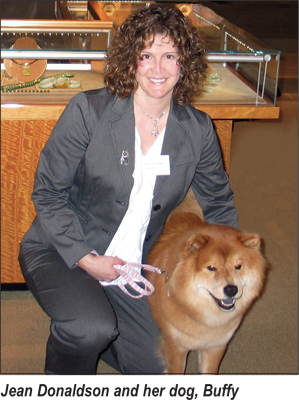| |
|

An interview with canine behaviorist Jean Donaldson
By Cindy Beckman
 Jean Donaldson joined The San Francisco SPCA in 1999 as the director of their newly developed Academy for Dog Trainers. She is the author of numerous books on canine behavior and training, including Culture Clash, which was the winner of the Maxwell Award for “Best Dog Training Book” from the Dog Writers’ Association of America, and the No. 1 “Best Book” in both 2000 and 2001 from the Association of Pet Dog Trainers. Jean Donaldson joined The San Francisco SPCA in 1999 as the director of their newly developed Academy for Dog Trainers. She is the author of numerous books on canine behavior and training, including Culture Clash, which was the winner of the Maxwell Award for “Best Dog Training Book” from the Dog Writers’ Association of America, and the No. 1 “Best Book” in both 2000 and 2001 from the Association of Pet Dog Trainers.
Ms. Donaldson was recruited by The SF/SPCA to establish a new training curriculum to help standardize and modernize the art of dog training. The hope was that by improving public training options, the number of dogs relinquished to public shelters due to behavior problems could be reduced. The SF/SPCA’s Academy for Dog Trainers is now commonly referred to as “the Harvard for dog trainers.” The certificate program is built around science-based, positive reinforcement methods. Programs vary from two-day seminars to six-week, full-time certificate schedules. Topics include animal learning theory, dog behavior and development, obedience and clicker training, class teaching, treating common behavior problems, critical thinking, and one-on-one counseling.
Ms. Donaldson offered to sit down with me to discuss her theories behind positive training methods for our readers.
How would you define positive training?
It means training that does not use any form of fear, pain, intimidation, or coercion to get the job done.
What hurdles does the common dog owner have to overcome to implement positive training methods?
There are a couple of them. I do think we live in a fairly puritanical society, where we want motivation to just be kind of automatic. In other words, just because I’m the master, or just because I’m human and you worship me, or just because of moral goodness or what have you, you should obey me.
Sometimes there is a reluctance to use rewards; it’s seen as a corrupting thing. If I reward behavior, somehow I’m cheapening the bond with my animal, that it’s some sort of bribery and it’s character deforming. I think that’s the main hurdle. Of course, no animal does anything for nothing – there’s no free lunch with behavior – so they end up using punishment-cloaked aversive means to get the job done, and then package it as some sort of magical motivational power, when in fact it is the usual kinds of tools: coercion, intimidation, pain, and fear.
How do you feel about the implication that certain types of dogs don’t do well with positive training?
It’s simply not true. It’s hard to know how to respond to something like that. I’ve been training this way for 20-odd years, and have trained the other way, and it is just not a supportable statement. I think it’s a marketing statement. I was in referral aggression for six years and would take the last-chance cases, so I know it’s just not true.
For someone to say that positive reinforcement doesn’t work is belying a pretty gross misunderstanding and lack of knowledge of really basic undergraduate principles of how animals learn. And I would question their competency if they made that kind of statement. If they say, “I prefer not to use it,” that’s a whole different issue. If they say they’re philosophically opposed to it for this, this and this reason, that’s a valid statement. But to go against roomfuls of research in pure and applied settings, not to mention the hundreds of thousands of dog trainers worldwide who are successfully using it, is curious indeed.
So the belief that bully breeds are more difficult to train has no merit?
They are more difficult to train to do certain tasks. I think if you are trying to train something that goes against the breed, that’s valid. But to teach a dog to sit or to come when called or not to growl around the food dish, then the playing field is level if you’ve got good technical knowledge.
Obviously, not everyone who comes out of the Academy for Dog Trainers will have an equal level of skills. How do you suggest that people find a skilled trainer?
It is definitely buyer beware. Obviously, we don’t have control over our grads. We have an occasional grad go “renegade” – they want our certification because it holds some weight, and then they go off and train however they want. And we will occasionally get complaints that, hey, we were expecting someone who was not going to harm our dog, and this [graduate] proceeded to use this tool or what have you. You know, we really cannot police what people do. So it is very much a buyer-beware market.
People need to decide how they are comfortable training, and they need to find a trainer who is a good match for them. So if they feel comfortable using choking and pain, because it is still legal to do so, they can find those trainers. They will usually advertise themselves as balanced, eclectic, mixed, and so on. If people are not comfortable hurting their dogs, they need to find trainers who will usually advertise themselves as nonaversive or all-positive. That will get the philosophy part down. The competence part is tougher. You may be able to find a trainer who has the right philosophy but then competence is a question.
It is probably best to get a referral from your veterinarian or from somebody who has no vested interest in it, as a good starting point. Maybe friends, colleagues, people who’ve had a good experience that can vouch for a trainer. CPDT [Certification Council for Professional Dog Trainers] is one designation. Our credential is another. It certainly means a trainer has at least tried to get a minimum of education.
Trainers who attend conferences, who attend seminars, those are all flags that they are probably a good trainer, but it’s not a guarantee. And certainly, if any trainer does something that somebody’s uncomfortable with, be it positive reinforcement or something that’s more coercive, just fire them right off. Do not be talked into it. Get somebody else.
The most important thing is to be really, really careful. Until we get dog trainer licensing, there is no consumer protection … I mean, if you think about it, you can’t even give a manicure or a haircut without minimum education and licensing. Dog training is the absolute Wild West.
So you feel there is a need to formally license dog trainers?
Trainers will get their act together and we will get our house in order, or it will be put in order for us. There will either be a consumer movement at some point, because people will be rightly outraged at basically being ripped off, or veterinarians and other professionals will do it. There’s been increasing rumblings from the veterinary community, especially the veterinary behavior community, for dog training to clean up its act. And that’s kind of a good thing. So it’s going to happen. Who is going to end up doing it, whether the trainers will beat the veterinarians or the consumers to the punch, is the question. What it’s going to look like is anybody’s guess.
What do you see as major dog training concerns here in San Francisco?
People need to consider dog-to-dog aggression. San Francisco is a dog park city. People are living in very close quarters in a lot of neighborhoods, and a lot of people want to use dog parks. So they need a dog – though some people can get by if it’s not important to them – that is dog park-friendly and that is leash-friendly. That, I think, is something that is particular to San Francisco. It’s such a dog park culture.
How about small dogs vs. large dogs in park issues?
We believe pretty strongly here that big dog/little dog is a dangerous mix. It’s inherent; it’s nothing to do with any breeds, though there are those that are known to be more predatory. It would be safer if there were designated areas for big dogs and little dogs. The logistics of that … ooh boy. You start talking about having timeshare or space division of existing park space, which is already at a minimum.
Big dogs are usually the focus of public concern for appropriate training, while small dogs often fly under the radar because the dog can just be picked up and carried away. Is there equal importance in training small dogs?
As you rightly point out, the ramifications of a small dog misbehaving are smaller. The incentive is less for people and so, quite predictably with human behavior being what it is, if people don’t have to do it they end up not doing it. Would it be nice if they did? Of course, it would be great. But I’m not sure if any time soon we’re going to be able to incentivize people with little dogs to do what they don’t feel is necessary. I think that one is tough.
What about the role of professional dog walkers?
It seems to me that there is sort of a stratosphere of walkers, and some of them are very good “dog wranglers” – in other words they are very good at handling a bunch of dogs, and they’ve got a bit of folk knowledge about behavior and they get their job done. And I think it’s a great thing for dogs to have to break up their day. I think there are some walkers who have made sure that they’ve gotten some extra training so that they’re a little more savvy, and those dog walkers can usually take on more problem dogs. So people who have a difficult dog and are looking for a walker can sometimes, if they really dig, find a walker who’s got some training. We even have graduates who do walking as well as their training, and they can find somebody who would be willing to take on [a difficult] dog. But someone with a garden-variety dog without any issues at all can use any walker that is well referenced to do the job for them.
Any last thoughts for our readers on the important qualities in dog trainers?
The great leveler is good technical knowledge … so there are two discussions. One is, are you technically competent? The other is, what is your philosophy, vis-à-vis, do you use pain in training? I think those are two discussions that people tend to muddle together, and say, well, you’re only competent when you use positive reinforcement. Well, not necessarily. You can only use positive reinforcement and be incompetent. Likewise, you can use punishment and be competent or incompetent. So these are modular qualities in trainers.
People need to be informed consumers. They need to know what they will be getting. They are going to be paying someone money to do something that first of all could do the dog harm, second of all could make the dog worse, so they have to consider the two issues of competence and philosophy, and make sure that they get somebody who is competent, and then somebody who philosophically makes them feel comfortable.
I want to thank Ms. Donaldson for taking the time to discuss this important issue with us. For more information on The SF/SPCA’s Academy of Dog Training, or for a list of their graduates, visit www.sfspca.org/programs-services/the-academy-for-dog-trainers.


|
|
|
|





 Jean Donaldson joined The San Francisco SPCA in 1999 as the director of their newly developed Academy for Dog Trainers. She is the author of numerous books on canine behavior and training, including Culture Clash, which was the winner of the Maxwell Award for “Best Dog Training Book” from the Dog Writers’ Association of America, and the No. 1 “Best Book” in both 2000 and 2001 from the Association of Pet Dog Trainers.
Jean Donaldson joined The San Francisco SPCA in 1999 as the director of their newly developed Academy for Dog Trainers. She is the author of numerous books on canine behavior and training, including Culture Clash, which was the winner of the Maxwell Award for “Best Dog Training Book” from the Dog Writers’ Association of America, and the No. 1 “Best Book” in both 2000 and 2001 from the Association of Pet Dog Trainers.
